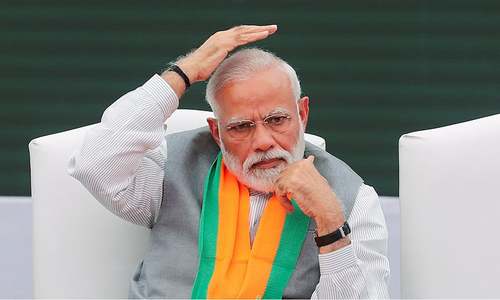Indian shares will reach a new record high by end-year, a Reuters poll of strategists showed, building on an election-driven rally in which investors have bet the ruling party will retain power and continue current economic policies.
The BSE Sensex index rose by its biggest amount in one day since September 2013 on Monday after exit polls showed the National Democratic Alliance (NDA) party led by Prime Minister Narendra Modi will retain power for a second consecutive term.
Final results are due on Thursday.
Money, money, money: The tycoon factor in India's election
Having gained eight per cent so far this year, the index is forecast to add another 2.6pc by end-2019, touching an all time high of 40,000 from Tuesday's close of 38,969, the poll of nearly 50 strategists taken May 14-21 showed.
That was the first upgrade to the 2019 outlook since August last year.
All but one of the equity strategists who answered an additional question said they have factored in either the Bharatiya Janta Party winning a majority or a victory of the BJP-led NDA in to their forecasts.
“I feel a stable government and more policy action to come will definitely give a boost to the economy and that will act positive for the market,” said B.V Rudramurthy, managing director at Vachana Investments.
“Even if the BJP makes it as per exit polls, there will be one correction post the 23rd, which will happen even if NDA gets 300+ seats. This is because global markets are not supporting a rise.”
Indeed, the predicted rise is much smaller than the 15pc percent stock market surge in the first six months after Modi came to power in 2014, suggesting some investors are less optimistic about the NDA administration than they were then.
The benchmark index is forecast to hit another fresh high of 42,250 by end-2020. Similar gains are predicted for the broader NSE index.
The overall optimism among investors lines up with a separate Reuters poll of mostly financial sector economists conducted last month, which concluded that the BJP winning a majority or a BJP-led NDA government would be best for the economy.
“As per the exit polls, NDA led by BJP is likely to easily cross the half-way mark. Markets will heave a big sigh of relief as it favours continuity and familiarity in terms of roll-out of policies,” said Ajay Bodke, CEO at Prabhudas Lilladher.
The Reserve Bank of India cut interest rates twice before the elections. Like most major central banks, it is not expected to tighten policy any time soon, another factor that has kept share prices around the world well-bid this year.
However, not all respondents were optimistic.
Nearly one in three contributors forecast the index to decline from the current level by end of this year, including four participants predicting a correction — a decline of 10pc or more.
“We do expect weakness in global equities throughout the rest of the year as the global economy disappoints,” said Shilan Shah, senior India economist at Capital Economics.
“For India, especially with the recent rally, they (stocks) look extremely stretched [...] It is one of the reasons to think the rally probably can't continue for much longer.”
Shah has predicted a decline of nearly 12pc by end-2019 with one of the most pessimistic calls at 34,250.
Foreign portfolio investors (FPIs), who remained net buyers of Indian stocks in the previous three months, have sold off $618.11 million of equities so far this month. Although stocks have recovered, FPIs continue to be risk averse.
Although stocks have risen about 65pc since Modi first took office in 2014, that was significantly less compared to the previous two terms of the Congress party led UPA (United Progressive Alliance) between 2004-2014.
The reason for lagging was largely due to weak corporate earnings, which fell about 4pc annually during Modi's tenure after gaining nearly 12pc under the prior government.
This is also reflected by a higher average price-to-earnings ratio and lower dividend yield under Modi's tenure.
“At present stocks are defying gravity. With the price-to-earnings ratio at an historic high of 28, the market is too expensive. My fear is if earnings don't pick up soon, the chances of a correction are high,” said Mileen Vasudeo, senior equity analyst at Arihant Capital Markets.














































